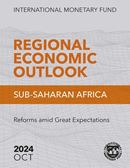This web page provides information in on the activities of the Office, views of the IMF staff, and the relations between Kenya and the IMF. Additional information can be found on Kenya and IMF country page, including official IMF reports and Executive Board documents in English that deal with Kenya.
At a Glance
- Current IMF membership: 191 countries
- Kenya joined the Fund in February 3, 1964; Article VIII.
- Total Quotas: 542.8 Million
- Loans outstanding: Stand-by Arrangement SDR 352.82 Million SCF Arrangements SDR 135.70 Million
- Article IV/Country Report: January 17, 2024. (IMF Country Report No. 24/13)
Office Activities
-
What is the new Kenya program?
Kenya has large financing needs on account of the adverse effects that the COVID-19 pandemic has created. The government has developed a medium-term reform program to address the challenges, articulated by the fiscal framework laid out in the recent Budget Policy Statement. The IMF is providing policy advice and financing to support the government’s program.
June 15, 2021
Statement on Standard Media Article
Standard Media on July 15 posted an article under the title “IMF: Kenya is world’s second most uncertain for investors.” The IMF fully dissociates itself with the content of the article. Please be aware that the World Uncertainty Index that is citied in the article, developed independently by researchers, is not an official IMF output.Fraudulent Scam Emails Using the Name of the IMF
We would like to bring to the notice of the general public that several variants of financial scam letters purporting to be sanctioned by the International Monetary Fund (IMF) or authored by high ranking IMF officials are currently in circulation, and may appear on official letterhead containing the IMF logo. The scam letters instruct potential victims to contact the IMF for issuance of a “Certificate of International Capital Transfer” or other forms of approval, to enable them receives large sums of monies as beneficiaries. In other cases, they claim to offer loans against payment of a negotiation fee. The contact e-mail information is always BOGUS.For more information please see Fraudulent Scam Emails Using the Name of the IMF
IMF's Work on Kenya
-
November 4, 2024
This is an on the record briefing on Kenya's seventh and eighth reviews under EFF/ECF and also review under the RSF.
-
November 1, 2024
Series:Country Report No. 2024/316
-
October 30, 2024
The Executive Board of the International Monetary Fund (IMF) concluded today the seventh and the eighth reviews under the extended arrangement under the Extended Fund Facility (EFF) and the arrangement under the Extended Credit Facility (ECF), approved in April 2021, and a review under the Resilience and Sustainability Facility (RSF) arrangement, approved in July 2023, with Kenya.
-
Introductory Remarks at the IMF’s African Department Press Briefing
October 25, 2024
Thank you for joining us today for the release of the October IMF Regional Economic Outlook for sub-Saharan Africa. Before we begin and take your questions, I would like to share some thoughts on the current economic developments in the region. The first point I would like to make is that economic growth in sub-Saharan Africa remains subdued, especially in per capita terms.
-
Transcript of Press Briefing: Sub-Saharan Africa Regional Economic Outlook, October 2024
October 25, 2024
Economic growth in Sub-Saharan Africa remains subdued, particularly in per capita terms. We are projecting growth this year at around 3.6 percent, the same as last year, with some signs that it is beginning to accelerate, and we're projecting that it will reach around 4.2 percent next year.
Regional Economic Outlook
October 25, 2024
Sub-Saharan African countries are implementing difficult and much needed reforms to restore macroeconomic stability, and while overall imbalances have started to narrow, the picture is varied. Policymakers face three main hurdles. First, regional growth, at a projected 3.6 percent in 2024, is generally subdued and uneven, although it is expected to recover modestly next year to 4.2 percent. Second, financing conditions continue to be tight. Third, the complex interplay of poverty, scarce opportunities, and weak governance--compounded by a higher cost of living and short-term hardships linked to macroeconomic adjustment--are fueling social frustration. Within this environment, policymakers face a difficult balancing act in striving for macroeconomic stability while also working to address development needs and ensure that reforms are socially and politically acceptable. Protecting the most vulnerable from the costs of adjustment and realizing reforms that create sufficient jobs will be critical to mobilize public support.
Read the Report
Departmental Papers on Africa





